To Understand Authoritarian Rule, Read These Five Novels
We now understand more than we ever have about what makes authoritarian regimes work; in a previous post, we launched a series reviewing this work. While political science frequently favors large historical factors in explaining autocracy, it has less to say about psychological drivers and lived experience—what autocracies look like from the inside and what it feels like to live under dictatorship. Yet understanding those elements of authoritarian rule is not incidental to our broader comprehension.
And what better way to approach the messy, complicated, human side of autocracy than through stories? Stories motivate, surprise, and provoke. From the Latin American caudillo novel, to books on European fascism, Soviet rule, and authoritarian regimes in the developing world, fiction grounds politics in personal experience: uncertainty and violence, courage and cowardice, and resistance and complicity; the enduring effects of liberties stripped away.
In launching this book review series, I turned up a range of forms. Some of the novels reviewed here read like historical fiction and are grounded in deep research. Others are imagined memoirs. Some are part of the long tradition of political dystopia. We have much to learn from these stories about how autocracy works and fails, lives and dies, and the way it affects the lives of its victims.
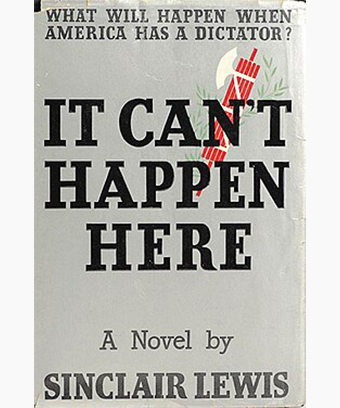
It Can’t Happen Here by Sinclair Lewis (1935, Doubleday)
Not surprisingly, Lewis’ alternative history of the United States, written in 1935, has seen a recrudescence. In the novel, populist candidate Buzz Windrip defeats Franklin Delano Roosevelt for the 1936 nomination and then his moderate Republican rival in the general election. During his campaign, Windrip—modeled on Huey Long—unveils his “Fifteen Points of Victory for the Forgotten Men.” The platform is a whip-sharp sendup of contradictory populist ideas. His government would “guarantee Private Initiative and the Right to Private Property for all time” (Point 3), but nationalize finance, mining and oil, as well as all utilities, transportation, and communication (Point 1), and limit incomes at the top of the distribution (Point 5). Workers form the core of the Windrip coalition and are given vague promises of a minimum income (Point 11), but unions are to be integrated into state-corporatist arrangements that weed out radicals (Point 2). Once in office, Windrip’s economic ideas implode and the unemployed are swept into labor camps where they are paid a dollar a day.
Religious freedom is guaranteed, but not if you have minority views. Jews, for example, are required to “swear allegiance” to the New Testament. Tellingly, Black people are disenfranchised and women are to be put back in the kitchen and nursery. In Point 15, Lewis packs all of the institutional detail required to make such a program possible: the executive is given virtually unlimited powers, Congress is made advisory, the Supreme Court stripped of all powers of judicial review.
The book is a case study in democratic backsliding: bit by bit, things get worse and worse as resistance is met with repression. A telling component of the political model: the formation of a militia—the Minute Men—who are given free rein vis-à-vis the dwindling opposition to Windrip’s regime. Nonetheless, the resistance refuses to die, and much of the drama centers on the costs borne by those who stand up.
What gives the novel resonance is Lewis’ uncanny intuitions about the social foundations of the authoritarian impulse. Families and friends cleave for a variety of reasons, including principle and opportunism, and those decisions account for the novel’s drama. Some decide to flee the country altogether. But there is a deep class foundation to the book, with a resentful underclass taking advantage of the opportunity to get their revenge in ways both large and petty.
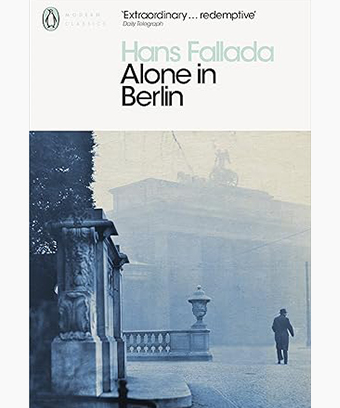
Alone in Berlin by Hans Fallada (1947, Penguin edition translated by Michael Hoffman 2009)
Was it rational for individual citizens to resist the Nazi regime in 1941, when Adolf Hitler was at the peak of his powers at home and riding a wave of strategic successes abroad? This question sits at the center of Fallada’s powerful novel, which is based on a true story. A working class couple, Otto and Anna Quangel, lose a son in the war and gradually converge on an act of everyday resistance: drafting subversive postcards that they leave in apartment buildings around the city. Although the game of cat and mouse with the authorities makes the book into a kind of policier, Fallada also takes us through the personalities that thrived under Nazi rule. The portrait gallery is not appealing: sadists, antisemites, but above all opportunists seeking to profit from the misery of others. Fallada captures how easily a regime with this sort of political base can turn on its own, leaving once loyal enforcers in shock.
Fallada’s novel unwraps the question of whether it made sense to resist. At one level, the answer is clearly “no.” The novel does not shy away from the repercussions of the Quangel’s decisions as others become implicated in their scheme in predictably tragic ways. Moreover, despite risking their own and others’ lives, there are recurrent doubts about whether their protest has any political effect whatsoever.
On another level, however, Fallada suggests that resistance is rational—and indeed the only moral choice. As the taciturn Otto Quangel reflects, “the criminals are in power and the innocent are prosecuted.” Here resistance is judged less by whether it “works” and more by an ethic that refuses to participate in a system that is morally upside down.
For those interested in the judiciary, a theme in the IGCC Future of Democracy initiative, Fallada offers a Kafkaesque portrayal of the absurdities of authoritarian justice. Dragged through a harrowing and cruel process, the Quangels appear to triumph over their tormentors. Or do they? And in what sense? The answers are by no means obvious.
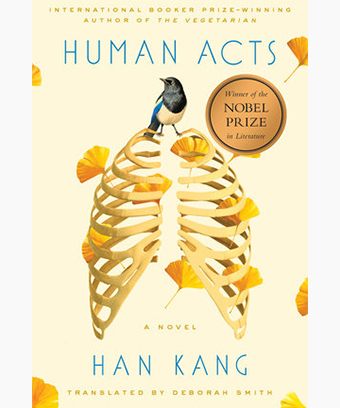
Human Acts by Han Kang (2014, Portobello edition translated by Deborah Smith 2016)
American audiences were introduced to the 2024 Nobel laureate Han Kang through The Vegetarian (2007, translated 2015). But in South Korea, Human Acts struck closer to home. The novel is one of many untangling the Kwangju massacre of May 1980, in which the increasingly authoritarian military government of Chun Doo-hwan put down a democratic uprising, killing hundreds. The event was central in U.S.-South Korean relations. The belief was widely shared across an entire generation that the United States acquiesced in Chun’s political ascent and even in the massacre itself because of a preoccupation with events in Iran.
The novel follows the long-lived ripples from the death of a teenager (Dong-ho, the “boy who comes” in the Korean original) during the uprising. Dong-ho and his friends are part of a spontaneous outpouring from civil society, and the novel starts with them attending to massacre victims, assuring that they are united with family and afforded proper burial—until Dong-ho himself is killed. From there, the book unfolds in a series of acts narrated by those who intersected with him. Yet the book is not just about memory and loss. It turns out that each of the narrators is living with their own traumas from the authoritarian era: the aftermath of cruelty and torture, ruined careers and lives, emotional depletion. There is a chapter that veers into magical realism, but most of the writing focuses on the persistent, dull aches from the past.
The novel also touches on artistic resistance: the effort to record, represent, and remember the efforts of the censors not only to squash memory but to intimidate. In its last act, Han Kang reflects on her own effort—decades later—to gain some entry point into the events of 1980. What is the appropriate way to bear witness?
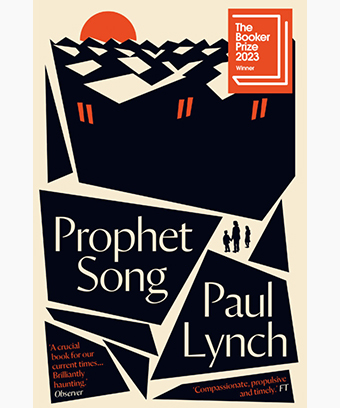
Prophet Song by Paul Lynch (2023, Oneworld Publications)
This novel, which won the Booker Prize, is set in an Ireland gone wrong, and does an extraordinary job of capturing the process of democratic backsliding. Things seem normal until small departures from the rule of law start to show; for example an Emergency Powers Act and a new secret police force, the Garda National Services Bureau, to enforce it. Two thirds into the book, Ireland is not only manifestly autocratic, but engulfed in full-blown civil war.
Two recurrent themes align well with what we know about autocratic rule. The first is the continual uncertainty about what the rules are, if any. Although it is a far-right party that comes to power, officialdom seems less set on some particular political project than it is in opacity: the regime makes it impossible to find out what has happened to its victims. The second element is the fact that most households don’t allocate much time to politics: they are too busy leading their lives. Under autocratic rule, though, leading your life can become complicated: where to find milk and diapers, how to take care of an aging father, and, redolent of the Troubles in Northern Ireland, how to get from one side of the city to another.
The protagonist of the novel is Eilish Stack, who has to put more and more effort into simply holding her family together after her husband, a labor union organizer, is arrested. The book is written in an odd style with long, run-on paragraphs that capture the rush of a scene and the foreboding sense of political chaos and uncertainty. The narrative arc centers on the centripetal stresses within the family—some of them political—and the steadily increasing difficulty of holding together. As always in authoritarian novels, violence and loss recur. But in the denoument, Lynch succeeds at a striking inversion: as Ireland becomes a civil war country, the choices of its citizens look increasingly like those of people displaced by the wars in the Middle East and Africa. Lynch is savvy: sympathy may be easier to evoke when victims are people like us, and the novel thus ends up as a deep critique of our own callousness.
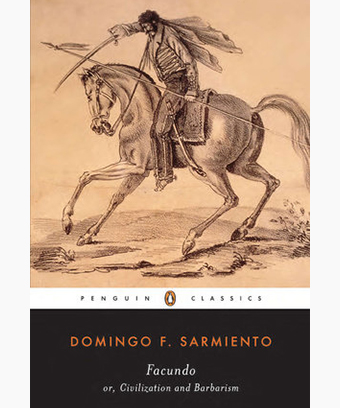
Facundo: Civilization and Barbarism by Domingo F. Sarmiento (1845, Penguin edition translated by Mary Mann 1998)
This book defies contemporary genres. It is in part a social treatise about the deep cleavages in early 19th century Argentine politics (it’s been compared to Alexis de Toqueville) and in part a biography of the charismatic soldier-autocrat, Juan Facundo Qurioga. But Sarmiento is also fictionalizing and moralizing. The book is the ultimate font of the Latin American caudillo novel, which endured as a form thanks to the authoritarian wave across the continent that began in the mid-1960s.
Sarmiento argues that early Argentine politics pitted a violent, barbaric gaucho culture against the civilization of the Enlightenment project (thus the title). This binary was reflected in competing political forces in which a centralizing model of government—which Sarmiento associates with the city, the rule of law and progress—came into conflict with a federal one, in which local and provincial elites maintain power and discretion and rule as strongmen. The setting is one of civil war, in which militaries naturally gain power. But there is plenty on the arbitrary and violent way regional caudillos ruled, which Sarmiento sees as a failure of both gaucho culture and individual character. A consistent theme is the unwillingness of the autocratic personality to be bound by any rules, which naturally means a disregard for law, a willingness to use violence as a political tool and a disinterest in actually governing. Many of the novelistic elements of the book center on extraordinary acts of terror, cruelty, and impetuosity. Who lives and dies is ultimately arbitrary.
Sarmiento was a protagonist in these fights and periodically in exile. He justifies his dark tales by looking forward, and the book is also a liberal political manifesto not only for Argentina but for the continent:
“[Has Facundo] ever done the least thing for the public good or been interested in any useful object? No. From them come nothing but blood and crimes. I have given these details at length because in the midst of horrors such as I am obliged to describe, it is comforting to pause on the few progressive impulses which revive again and again after being apparently crushed by savage barbarisms. Civilization will, however feeble its present resistance, one day resume its place” (p. 168).
Agustina Paglayan pointed out to me that Sarmiento was hardly a liberal in the 20th century sense, no more than our slave-owning Lockian founding fathers. Sarmiento justified the killing of indigenous peoples and advocated for educational indoctrination. Yet the tradition of the caudillo novel has its origins in Facundo, and has been a staple of Latin American fiction ever since.
Stephan Haggard is distinguished research professor at the UC San Diego School of Global Policy and Strategy and research director for Democracy and Global Governance at IGCC.

Global Policy At A Glance
Global Policy At A Glance is IGCC’s blog, which brings research from our network of scholars to engaged audiences outside of academia.
Read More